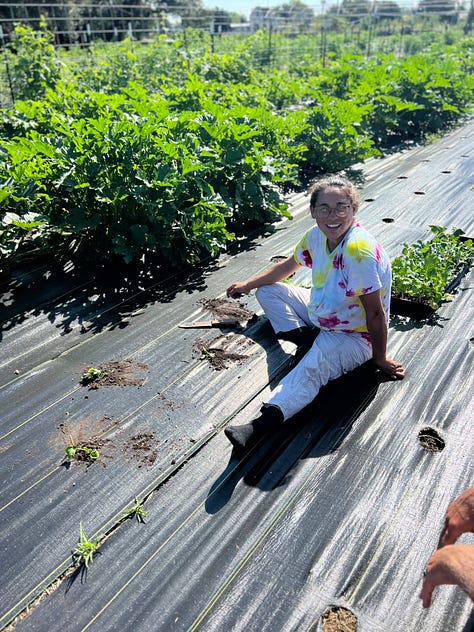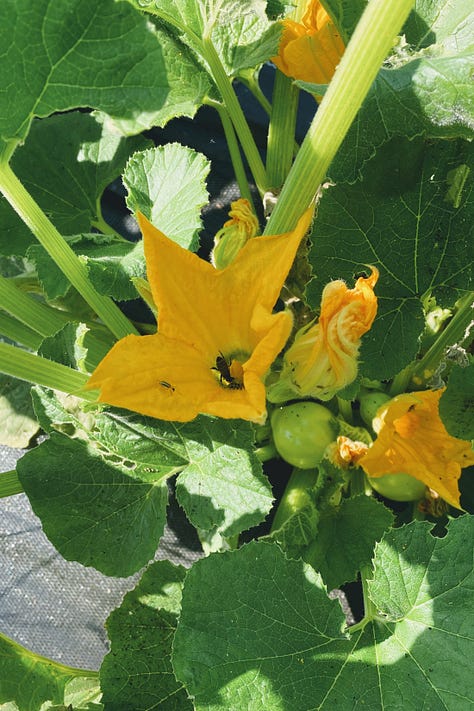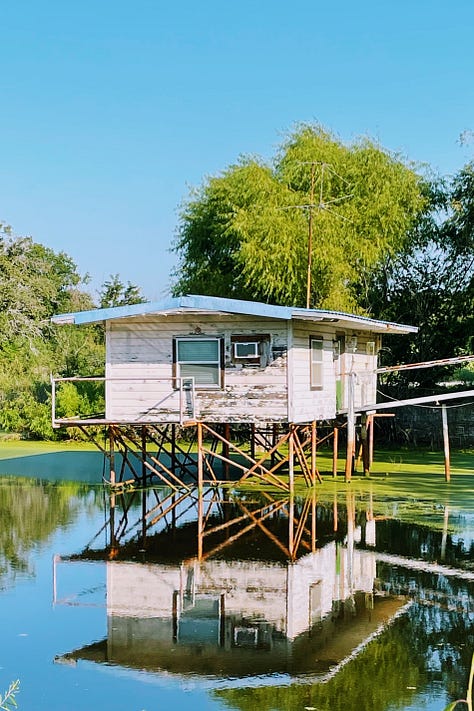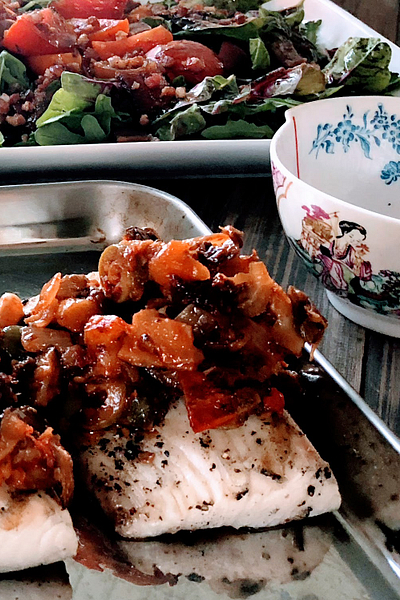Farmer to Table: The Stories of Those Growing Our Food | New Series + Recipe
No. 1 - Mariah with Cherokee Lakes Farm
For a long time, I’ve wanted to document the stories of farmers. Not just any farmers, but those who work hard to provide us with the healthiest versions of food. Food that hasn’t been tainted by chemicals and was harvested days before it hits my table.
Mariah’s farm, Cherokee Lakes, is first because her bambino is very close to joining her on the farm but that didn’t stop her from working away the day we were there.
8-month pregnant Mariah hops up - literally…no moaning and groaning like most women at this stage of pregnancy - to greet us from her former position sitting on the ground planting seedlings. Her farmhand Katy is nearby burning holes in landscape cloth making them ready for the tiny plants.
Girl Power is clearly the fuel behind this farm.



The Problem
Post college, Mariah worked as farm manager with Project 44-Org, a farm providing fresh produce to food deserts. While the cause was good, the practices they used - Roundup and other chemicals, deep plowing, and tilling - were known to destroy the surrounding ecosystem and microbiome of the soil. This disturbed her greatly, so while she supported the cause, finding a solution to this problem became paramount.
Mariah and another farm worker set about learning all they could about sustainable farming. After being in the field for eight or more hours they would spend their evenings drinking beer and devouring every possible form of media teaching about sustainable farming. They attended conferences on their own dime on weekends. All of this with the goal to convince the board of Project 44 to begin applying their knowledge and transitioning the farm to a more sustainable, regenerative model. Sadly, the plan was rejected.
The Solution? Do Nothing.
In 2019, Mariah and her husband Paydon bought the 7 acre farm from Project 44. The clay soil, as tough as the state of Texas itself, gave way to no more than a fingertip’s depth when she tested the tilth. Her response to the consensus of everyone around her recommending tilling? “No…we’ve done enough of that here. I wanna see what happens without tilling it at all.”
The couple didn’t get any grants to pay for the land which would lead most farmers to plant cash crops immediately to recoup investment. Mariah, however, chose to continue learning all she could while allowing the ground to go fallow for almost two years, each field covered with silage cloth to encourage probiotic activity in the soil.
Patience Pays Off
As she beyond-her-years wisely pointed out, “you’re exchanging mechanics (and chemicals) for time.” One example she gave was when a 100-foot row of her prized heirloom tomato plants - and highest priced of her crops - was covered with aphids, mortal enemy of tomato plants. While she could have sprayed any number of so-called “natural” pesticides to quickly get rid of them, she simply covered them with cloth knowing she would lose that income.
A few weeks later when she lifted the cloth, the tomato plants were unfazed and the aphids were completely mitigated by THEIR mortal enemy, ladybugs and later all the way to the first week of December, we were happily buying beautiful field grown heirloom tomatoes. Government grants have allowed her to buy more land, build hoop houses and create a wildflower sanctuary which in turn brings more pollinators to help propogate over 50 varieties of specialized open pollinated fruits and vegetables raised with the utmost intentionality for flavor.
Seed keeping allows the sometimes weaker heirlooms to adapt and evolve to fit the local climate and therefore thrive resulting in tomatoes as sweet as any fruit, pristine lettuces in every color including my fave purple speckled and melons and stone fruits that literally taste like candy.
By the time she started planting her heirloom seeds in late 2020, her patience had paid off with the soil depth increasing six inches to reach her wrist. The first year of crops came in 2021 and her newfound customer base - including our family - became the beneficiaries of her patience.






Hard Work Inheritance
A first generation American, Mariah was primarily raised by her hard-working father. He chose to learn English when he moved to the states from Central Mexico to do manual labor, but raised with no formal education he doesn’t read or write in either language.
While he may not understand or abide by American customs, Mariah’s dad taught her and her siblings manual tasks and how to work hard to get ahead in life. Many children would balk at having to work consistently in life, but clearly his love and mentorship impacted Mariah enough to go to bat for him to receive his proper immigration registration during a deportation hearing. “Wherever he goes I go” was her response to the judge knowing that her options in the States would be going into the system or living with her mom who had been out of her life for years. They granted him legal status from that point forward to allow the children’s lives to not be uprooted with deportation.
Now, he is a critical part of the farm. Besides helping with maintenance, harvesting and other tasks, he has been known to confront neighbors when they are threatening to spray Roundup with the promise that he will hand weed their beds instead. (Who does that?)



The Future of the Farm
While Mariah and Paydon prepare for baby number one, they are also starting a new chapter with the farm. Their choices have created an ecosystem, not just in the soil but in the whole neighborhood.
Tom, the same neighbor Mariah’s dad had confronted, finally came around to understand what she’s doing and why. He’s on her side now, agreeable to her methods and not disturbing them.
Another property owner down the road has agreed to let her pasture grow wild to encourage more species of birds and other animals to be attracted.
Keeping the land will protect what they’ve worked so hard to welcome rather than replace. And clearly they’ve succeeded as noted by the multitude of amphibians, which, according to Mariah, are the biggest sign of a healthy ecosystem. Conversely, she said “they are the first to leave when the land is no longer thriving.”
The Mercers have no intention of selling the land even with big developments enchroaching and major money at hand. The neighbors seem to agree and are all on the same page. None of them want the land to be plowed and clear cut for the next McMansion neighborhood as has happened in nearly every small town surrounding the Dallas/Fort Worth area. Instead there’s the glint of a dream of making this an agritourism destination with some unique structures included with the land.
The Next Generation
These days, even with birth looming any day, she works 70+ hour weeks working in the rows of vegetables and loving every minute of it. When we were talking about this unusual habit for a woman nearing birth, she laughed saying “what else am I gonna do? Sit inside and watch TV?”
What else am I gonna do? Sit inside and watch TV?
As we were talking just prior to leaving she was talked dreamily about her little one being in the field with her. I imagine her children will grow up with a work ethic just like she learned from her dad. Rather than an iPad in their hands to occupy them, they will be entertained by an entire ecosystem of nature.
Before you go on to the recipe, would you consider becoming a paid subscriber. Of course you’ll get the included budget-friendly meal plans, but more importantly you’re helping me by being my patron - allowing me to continue tell the stories of those linking food and community.
In addition, you make it possible to grant subscriptions to those who NEED the convenience of gluten free meal plans like Sarah, who wrote “I loved your (meal plans) but I can’t afford to pay” Here’s what she said when I told her about the grant:
“That would be amazing! I really enjoyed it since I am newly gluten free and some of your receipts were super helpful.”
Caponata - A Celebration of Eggplant to Last Through the Winter
Each time I highlight a farmer, I’ll be creating a recipe to celebrate what’s in season on my visit. With eggplant nearing it’s end, I wanted to introduce you to this recipe that can be frozen for up to a year to allow you to enjoy it even when the evenings are cold and dreary.
Caponata is a Sicilian specialty made from end of summer veggies which we happen to still have in excess here in Texas - eggplant, tomatoes, garlic and onions - and amped up with several other flavors to create a sweet and savory chunky condiment to use on grilled fish or chicken, serve with really good bread or even tuck in an omelet with goat cheese for brunch.
If these veggies are not in season, save this post to enjoy next summer.








I really enjoyed this article! Look forward to the next ones to come🤗
Great article, Christi! I'm excited for this series and enjoyed getting to learn about Mariah.